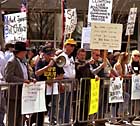HAVE GUN,
WILL VOTE |
By FRED BARNES
|
 Pro-gun activists protesting outside President Clinton's speech on gun
control in Denver last week. Pro-gun activists protesting outside President Clinton's speech on gun
control in Denver last week.
- AP |
WILLIAM
Schneider couldn't believe his eyes. The CNN commentator and fellow at the American
Enterprise Institute felt there must be something wrong with a recent CNN poll. It showed
Americans are evenly divided on whether George W. Bush, who doesn't talk much about guns,
or Al Gore, who has made gun control a theme of his presidential campaign, handles the
"gun issue" better. Schneider requested the question be asked again. It was -
with the same result.
The gun issue
isn't supposed to be playing this way in 2000. Democrats, liberals, the press, most of the
Washington political community, and even a good number of Republicans thought the politics
of the issue had been transformed, post-Columbine. No longer would the intensity be on the
side of the National Rifle Association and gun owners.
Now, it would be with
middle-class voters, suburbanites, soccer moms, and others who favor sweeping gun control,
including registration of all handguns. They would force queasy Republicans to swallow gun
control or else lose in this fall's election.
Quite the
opposite has happened. The intensity has shifted - strengthening the foes of gun control.
NRA membership is soaring and may reach 4 million by year's end. Most Republicans feel
politically secure on the gun issue, and President Clinton has jettisoned the
not-so-popular phrase "gun control" in favor of "gun safety."
Democrats made gun control the overriding issue last fall in the Virginia and New Jersey
legislative races. The result was GOP capture of both houses of the Virginia legislature
for the first time ever and easy Republican retention of the New Jersey statehouse.
In poll after poll, public
support for gun control has dipped. More important, public belief that more gun
restrictions are the answer to gun violence, especially among youths, has faded.
A new twist to
the debate has been crucial in undermining the drive for gun control. This is the
argument, stridently voiced by NRA executive vice president Wayne LaPierre, that existing
gun laws should be enforced before any new ones are enacted. "Finally, their side has
an argument the public is receptive to," says Karlyn Bowman, who monitors polls for
AEI.
Polls bear this out. A
survey in April by ABC News/Washington Post asked whether "passing stricter gun
control laws" or "stricter enforcement of existing laws" is the best way to
curb gun violence. Enforcement was preferred by 53 percent to 33 percent. In a survey for
YRock, the Young Republican Web site, GOP pollster Frank Luntz asked for reaction to this
statement: "Passing gun laws is what keeps politicians' careers alive. Enforcing gun
laws is what keeps the rest of us alive." Sixty percent agreed, 34 percent didn't.
By championing
enforcement, Republicans have deftly adjusted to a change in the gun debate that Democrats
were certain would help their side. In this regard, they first seized on Project Exile, a
program in Richmond, Virginia, in which criminals who use guns are prosecuted in federal
court, where trials are swifter and sentences harsher.
The Clinton administration
privately opposed expansion of Project Exile until last year, when a Senate hearing on it
was scheduled. The Saturday before, the president reversed the policy and used his radio
address to praise the program.
The public has
dramatically lost faith in gun control as a solution to violence in America, notably to
gun violence in schools. What would have the greatest impact in reducing school violence?
In the Luntz poll, only 10 percent said gun control; 77 percent said teaching about right
and wrong. Given other choices, 84 percent said parental involvement was the answer; 14
percent answered gun control.
One person who hasn't been
surprised by voters' attitudes about guns is Karl Rove, George W. Bush's chief strategist.
Bush, of course, echoes the GOP line about first enforcing, and then tinkering with,
existing gun laws. Rove characterizes the presidential race as between "one guy who
says the answer is more gun control" and "the other guy who says we've got laws
on the books people are breaking ... and while we need a few improvements, we need to send
a message that when you use a gun, you go to jail." The second guy wins 60 percent to
20 percent, according to Rove. He exaggerates, but he and Bush understand that the new
politics of gun control are a lot like the old.
Fred Barnes is executive
editor of The Weekly Standard (weeklystandard.com), where this article first
appeared. |
|
|


![]()
![]()